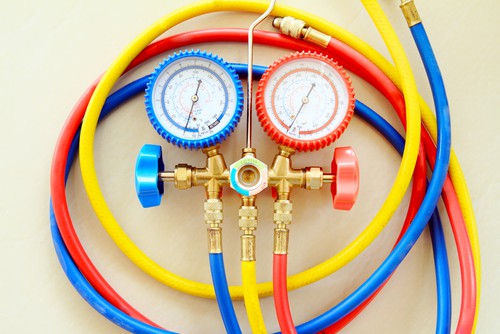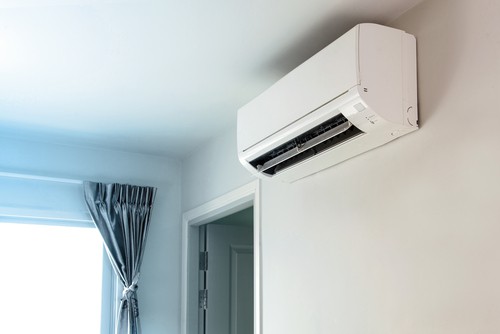Want to learn how to detect aircon gas leaking? Aircon gas leaking is a problem that should be dealt with as soon as it occurs. With a refrigerant leak, your air conditioner will eventually cease to produce sufficient cool air while it air-conditions a room. Although a more sensitive device can be useful for quickly identifying gas leaks on an air-con, you can also use alternative methods that are equally useful for finding the fault.
For instance, you can perform a visual inspection. With this method, you would have to look for discoloration or stains in the refrigerant piping, cooling coils, evaporator, fittings, and condensing coils. Furthermore, some technicians in the industry also add a bit of leak-detecting oil into the refrigerant charge as this provides visual evidence regarding where there are leaks in the air conditioning unit. Continue reading additional clever ways that make it easier for you to detect aircon gas leaks.
Common Causes of Air conditioner leaks
– Vibration tends to rub the refrigerant lines together and this is one of the major causes of gas leaks.
– An inexperienced technician can also damage the coil while trying to remove excess ice from the cooling oil.
– Corrosion is yet another major cause. It could lead to a gas leak when the evaporating coil or condensing coil corrodes.

Some Locations Where Leaks Often Occur On An Air conditioning Unit
– A corroded cooling oil is present in the handler unit. This is an expensive repair that often requires the replacement of the coil.
– Corrosion could also occur on the condensing coil that is fitted within the condenser. This is also an expensive repair that requires the replacement of the coil.
– Refrigerant lines that have suffered mechanical damage also cause gas leaks. This happens due to the vibration of the hard surfaces.
– Poorly soldered controls or fittings
– Leaky connections for instance around control valves and controls.
Some Very Practical Guidelines For Quickly Identifying Gas Leaks
What the majority of the leak-detecting device instructions do not clearly define is the practical procedures for examining air-con systems to find gas leaks.
– To begin the process, you need to make sure the refrigerant cooling, condensing, and piping coils are properly exposed as this allows for easier access. Furthermore, when the pressure of the compressor head reaches the peak, the safety mechanism will kick in and shut down the inbuilt compressor motor. However, you can also call in a technician to identify the problem on your behalf if you feel the procedures are somewhat complex for you to comprehend. A leak appearing on the lower section, on the other hand, is not good news since it is usually an indication that the entire system is contaminated with moisture, air, and dirt.
– If you have a leak detector or any other similar device, you can turn it on and begin using it.
– With a leak-detecting device, you can use the tip of the device while it is closely held to the cooling and piping coil surfaces. To do a proper check for leaks, you might want to start the process from a convenient point and follow the entire length of the tubing and the piping structures.
– It is a good idea to search for stains that are appearing on the refrigerant piping including the controls. The stains are an indication of constant gas leaks at the locations of staining.
– Also, you can listen carefully to any whistling sounds coming from the thermostatic expansion valve. If you notice any whistling sounds on this component, then the refrigerant could possibly be too low.

Different Ways of Diagnosing Refrigerant Leaks On An Air Conditioning System
Some of the effects of gas leaks or loss of gas may present themselves in different ways although this largely depends on the location of the leakage. Leaks appearing on the upper section can be detected easily and almost effortlessly. Leaks on the lower side on the other hand or an air conditioning system are harder to detect and discover. However, the task can be made easier if sufficient air leaks in the piping system of the refrigerant.
Effects of Gas Leaks
Moisture freezes that occur at the metering device of the refrigerant could further interfere with the proper cooling of the unit. Furthermore, dirt particles can also jam the TEV or even clog the capillary tube. When a moisture freeze occurs in the thermostatic expansion valve, the aircon system is likely to cease working. However, some systems could begin heating up in order to get rid of the ice. Mostly, the aircon system will run properly for a period of time and once water droplets have passed through the aircon system and get to the TEV, it will freeze again.
If dirt is allowed to accumulate in the air-con system, it could easily cause clogging in the Thermostatic Expansion valve. As a result, it will permanently cease to work. If you want to diagnose moisture expansion as well as cap tube issues, add some heat to the component and check whether or not it thaws.
in worst-case scenarios, moisture collecting in the aircon piping system of the refrigerant could also mix together with the gas and this could cause acid build-up. This chemical reaction could shorten the windings of the compressor motor since it dissolves the lacquer present on the wires. When refrigerant gas combines with moisture, a black and stinky liquid is formed. So, this is yet another good method that you could use to detect a gas leak.
It is important to point out that the age of an air conditioning system does not make it leak refrigerant gas. It usually occurs as a result of aircon system complexities. Some people may opt to add more refrigerants particularly if they are having challenges tracing tubing and piping while searching for gas leaks. This is not advisable.
Simply adding more refrigerant gas is not recommended. Furthermore, old freon-based aircon systems pose damage to the environment especially when prohibited Freon gasses are released into the atmosphere. However, you can call a professional technician in Singapore to detect aircon gas leaking and carry out the necessary repair procedures.
